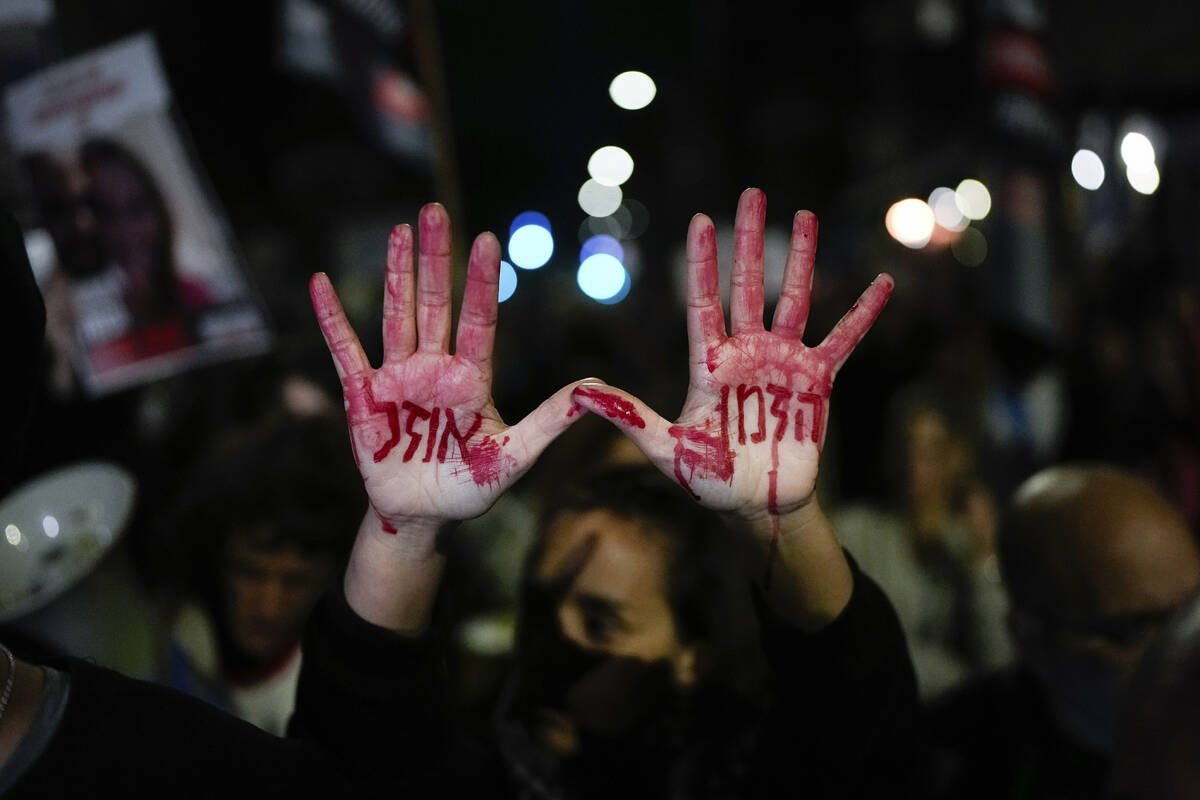Families of hostages held in Gaza storm Israel’s parliament meeting

JERUSALEM — Dozens of family members of hostages held by Hamas terrorists stormed a committee meeting in Israel’s parliament Monday, demanding a deal to win their loved ones’ release, as European foreign ministers joined growing international calls for Israel to negotiate on the creation of a Palestinian state after the war.
Israeli Prime Minister Benjamin Netanyahu has insisted to the Israeli public that pursuing the offensive in Gaza is the only way to bring the hostages home. At the same time, he has rejected the United States’ vision for a postwar resolution, saying he will never allow a Palestinian state.
In southern Gaza, Israeli strikes and shelling intensified in and around the city of Khan Younis. Gaza’s internet and phone networks collapsed again Monday for the 10th time during the war.
Netanyahu has vowed to continue the offensive until “complete victory” over Hamas and to return all remaining hostages after the Oct. 7 terrorist attack in southern Israel that triggered the war. In that attack, some 1,200 people were killed and Hamas and other terrorists abducted around 250 people.
Israelis are increasingly divided on the question of whether it’s possible to do either.
Around 100 hostages were freed under a weeklong cease-fire deal in November in exchange for the release of Palestinians imprisoned by Israel. Around 130 remain captive, but a number have since been confirmed dead.
Hamas has said it will free more captives only in exchange for an end to the war and the release of thousands of Palestinian prisoners.
Netanyahu has ruled out such an agreement, but anger is rising among hostages’ families. Relatives and other protesters set up a tent camp outside Netanyahu’s residence in Jerusalem, vowing to remain until a deal is reached.
On Monday, dozens of family members of the hostages stormed into a gathering of the Knesset’s finance committee, holding up signs and yelling, “You won’t sit here while they are dying there!”
“These are our children!” they shouted. Some had to be physically restrained, and at least one person was escorted out.
Death toll rising
Israel’s offensive has killed at least 25,295 Palestinians, according to the Hamas-run Health Ministry in Gaza. The ministry does not distinguish between civilians and combatants.
About 85 percent of the Gaza population has been driven from their homes by the war. U.N. officials say 1 in 4 people in Gaza is starving as the fighting hinders the delivery of humanitarian aid.
The Israeli military says it has killed around 9,000 terrorists in its offensive and blames the high civilian death toll on Hamas because it operates in dense residential areas.
The war has also stoked tensions across the region, with Iran-backed groups in Lebanon, Syria, Iraq and Yemen attacking Israeli and U.S. targets.
Netanyahu under pressure
Netanyahu faces pressure from the U.S. to shift to more precise military operations and do more to facilitate humanitarian aid into Gaza.
The United States is also calling for a reformed Palestinian Authority to govern Gaza after the war and for negotiations to start on a two-state solution. The authority currently governs pockets of the West Bank and was ejected from Gaza in 2007 when Hamas took power.
Netanyahu has rejected both the entry of the Palestinian Authority and the creation of a Palestinian state.
At a meeting in Brussels, European Union foreign ministers added their voices to the calls for a Palestinian state, saying it was the only way to achieve peace.
French Foreign Affairs Minister Stephane Sejourne said Netanyahu’s rejection of statehood was “worrying. There will be a need for a Palestinian state with security guarantees for all.”
“Which are the other solutions they have in mind?” EU foreign policy chief Josep Borrell said of Israel. “To make all the Palestinians leave? To kill them off?”
In an interview with CNN late Sunday, Saudi Arabia’s foreign minister, Prince Faisal bin Farhan, said the kingdom will not normalize relations with Israel or contribute to Gaza’s reconstruction without a credible path to a Palestinian state. His comments were notable because before the war, the U.S. had been trying to broker a landmark normalization agreement between Saudi Arabia and Israel.
———
Shurafa reported from Deir al-Balah, Gaza Strip. AP correspondent Jack Jeffery in London and AP writers Lolita C. Baldor and Tara Copp in Washington contributed.